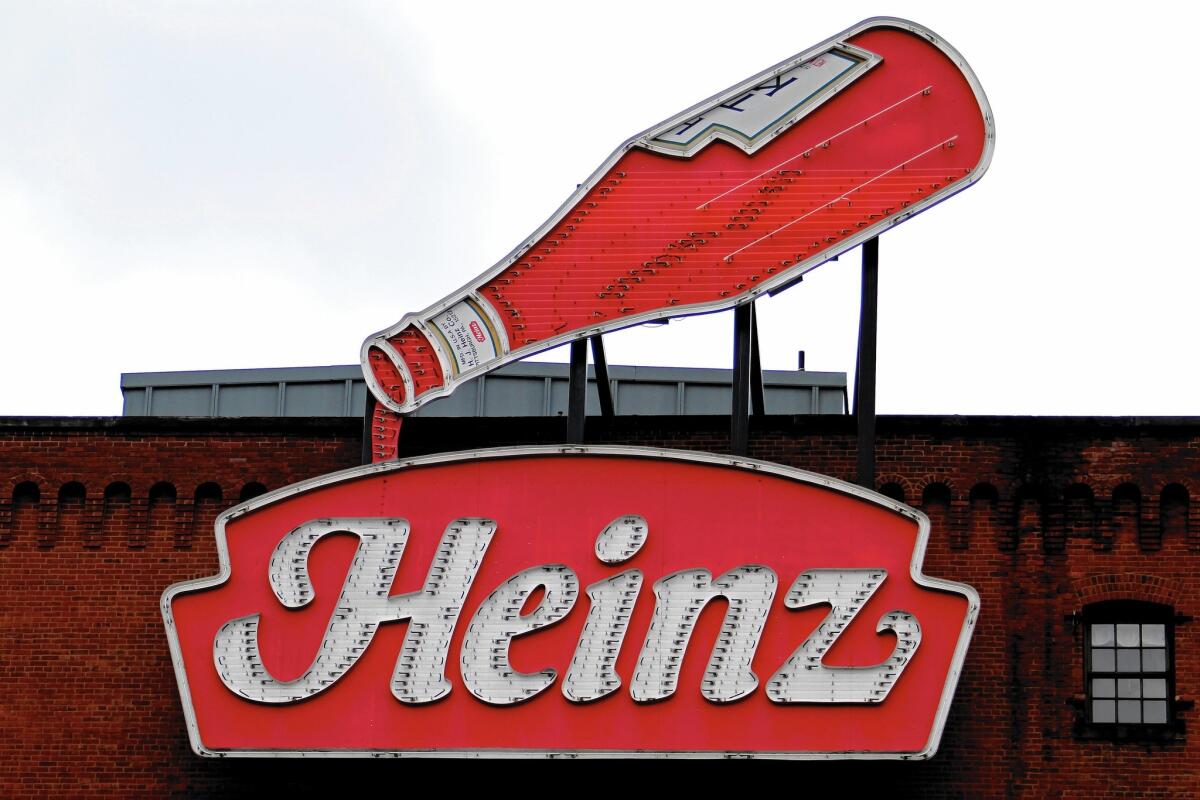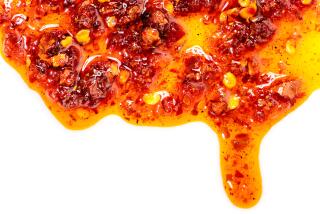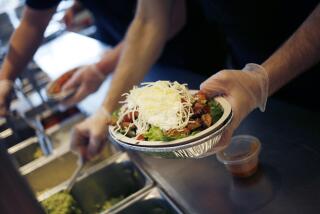H.J. Heinz to buy Kraft Foods Group in deal estimated at $36.6 billion

Consumers’ growing appetite for healthier fare is pushing together two of the world’s largest processed-food companies — a deal that would combine an extensive shopping list of household names including Heinz Ketchup, Kraft Macaroni & Cheese, Oscar Mayer Wieners and Jell-O.
H.J. Heinz Co.’s plan to buy Kraft Foods Group Inc. was engineered by Heinz’s owners, Brazilian investment firm 3G Capital and billionaire investor Warren Buffett’s Berkshire Hathaway.
The stock-and-cash transaction would be the biggest acquisition this year, according to research firm Dealogic, which valued the deal at about $36.6 billion, plus the assumption of nearly $9 billion in debt. Heinz and Kraft didn’t put forth an overall value.
The new company would be the third-largest food and beverage company in North America and the fifth worldwide.
“The entire industry has faced head winds,” Kraft Chief Executive John Cahill said on a conference call Wednesday. He will become vice chairman of the new Kraft Heinz Co. “This is a transformative transaction for our industry. It allows us to move and grow faster than we could on our own.”
The companies said the combined operation would save $1.5 billion a year, partly through stricter budgeting.
Consumer advocates say the new mega-company could dissuade competition in the grocery store, leading to reduced choices for shoppers and potentially driving up prices, especially because Kraft has such a long list of popular brands.
“I think this is really about more for the stockholders than it is for the consumers,” said Jamie Court, president of Consumer Watchdog, a Santa Monica advocacy group. “We would encourage regulators to dig deep on these issues before giving approval to a market that may have a lot of brands, but has a lot fewer companies than it did a few years ago.”
Patrick Woodall, research director for advocacy group Food & Water Watch, said he was skeptical of company claims that $1.5 billion in annual cost savings would be implemented by the end of 2017.
Kraft and Heinz have few products that compete with each other, Woodall said.
“Rarely do any efficiencies pass on to consumers,” he said. “You don’t get a lot of efficiency combining ketchup with Velveeta.”
Kraft, the maker of Oscar Mayer meats, Jell-O and a host of other well-known but older brands, lately has struggled to keep up with rivals as shoppers demand fresher, less-processed food.
“As consumers, we’re getting a little more suspicious of major food conglomerates,” said Marlene Morris Towns, professor of marketing at Georgetown University’s McDonough School of Business. “If they can use this opportunity to come up with some interesting new products that are not just tastier but more healthy and address this shift in consumer tastes, I think it would be a great option for them.”
Kraft’s net income last year fell 62% to $1 billion and its revenue was little changed at $18 billion.
Since being spun off in 2012 from its parent Mondelez International, the global distributor of Kraft snacks, Kraft Foods Group has lost ground to larger rivals such as PepsiCo Inc. and lagged behind in the Standard & Poor’s 500 index.
The company has struggled to generate growth and even stumbled in an attempt to prop up its Jell-O brand.
Kraft has been faulted for being slow to crack the fast-growing organic market, where nimbler competitors such as Hain Celestial Group Inc. have seen rapid growth and won a rabid following on Wall Street.
Lake Success, N.Y.-based Hain has expanded beyond tea into other beverages, including Soy Dream soy milk, as well as snacks and health-oriented personal care products, and investors have responded by pushing up its shares more than 600% in the last five years.
The Heinz-Kraft marriage would allow the two companies to rethink their products’ image, said Kevin Paul Scott, co-founder of ADDO Worldwide, a brand consulting firm.
“I don’t see these companies moving away from the foods they sell,” Scott said. “I see them telling a better story about those foods, explaining to people how it can be healthier, connecting the food to a better product or even where it’s packaged.
The new company will be based in the Chicago area, home to Northfield, Ill.-based Kraft, and Pittsburgh, where Heinz has its headquarters.
Executives said it was too early to speculate on how many jobs might be eliminated after the deal is closed. Bernardo Hees, CEO of Heinz, will be CEO of Kraft Heinz Co. Alex Behring, chairman of Heinz and managing partner at 3G Capital, will become chairman.
Kraft shareholders would receive stock in the combined company and a special cash dividend of $16.50 a share, or approximately $10billion. Current Heinz shareholders will own 51% of the combined company, with Kraft shareholders owning a 49% stake.
Both companies’ boards have approved the deal, which is targeted to close in the second half of the year. It still needs approval from Kraft shareholders.
Shares of Kraft soared $21.84, or 35.6%, to $83.17.
Not all analysts are convinced the deal offers such value.
“The tie-up is also one of convenience” that won’t automatically solve the problems dogging the two companies, Neil Saunders, managing director of retail analyst Conlumino, said in a statement.
“Both brands have suffered from a slowdown in sales and are now looking to provide investors with a new growth story,” Saunders said. “This merger provides just that and comes with the usual narrative that a larger company with a significant portfolio of brands will be able to compete more efficiently and effectively.”
The deal represents the latest and biggest shake-up at Kraft. After splitting from Mondelez International in 2012, the food maker replaced CEO Tony Vernon with Cahill in December.
In a conference call with analysts last month, Cahill, a former chairman and CEO of Pepsi Bottling Group, acknowledged that changes were needed.
“We’ve done fine. This is not a broken company by any stretch. But we do need to adapt a turnaround mind-set in many ways,” Cahill said.
3G, a private equity firm, is best known in the U.S. food industry for linking up with Buffett’s Berkshire Hathaway in 2013 to buy Heinz.
3G, with offices in Rio de Janeiro and New York, acquired Burger King in 2010. It combined that company with Canada’s Tim Hortons, forming Restaurant Brands International in 2014.








